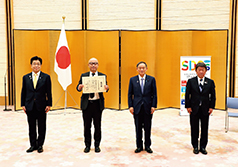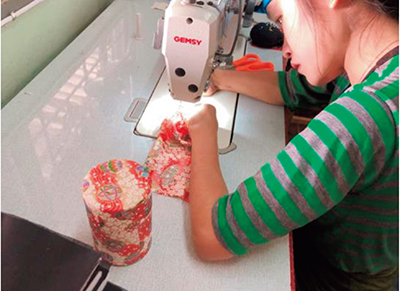ODA Topics8
Japan’s Efforts toward Achieving the Sustainable Development Goals (SDGs)
—4th Japan SDGs Award—

Commemorative photo with Minna-Denryoku, Inc. (winner of the SDGs Promotion Headquarters Chair’s (Prime Minister’s) Award) at the 4th Japan SDGs Award ceremony (December 2020) (Photo: Cabinet Public Affairs Office of the Government of Japan)
The Government of Japan has been presenting the “Japan SDGs Award” since 2017 to acknowledge companies and organizations for excellent initiatives that contribute to the achievement of the Sustainable Development Goals (SDGs), from the perspective of making SDGs-related initiatives across Japan more visible and promoting those actions.
At the 4th Japan SDGs Award ceremony held in December 2020, Minna-Denryoku, Inc., a company making efforts to promote partnerships between regions through renewable energy under the concept of “traceable electric power™”, received the SDGs Promotion Headquarters Chair’s (Prime Minister’s) Award. Also awarded were efforts to achieve the SDGs in Japan and overseas by a broad range of organizations and groups. These included an agricultural high school striving to develop environmental and agricultural technologies to solve challenges in developing countries, and an NPO helping people with disabilities and former child soldiers become self-reliant.
○ Examples of Efforts by Award Recipients

Workshop for people with disabilities in Laos (Photo: Support for Woman’s Happiness)
Minna-Denryoku, Inc. launched a renewable energy retail business in 2016 under the concept of “traceable electric power™.” The company realized the commercialization of an electric power traceability system that uses blockchain*1 for the first time in the world, allowing electric power consumers to know how much electric power they purchased and from which power plant.
In 2019, the company started the Yoko-Yoko Project, which links electricity users in Yokohama City, Kanagawa Prefecture with power generators in Yokohama Town, Aomori Prefecture, in the northern part of Japan. Using the traceability system, electricity produced in Yokohama Town is supplied to companies and other entities in Yokohama City. This project aims to promote decarbonization in the city and revitalize the regional economy, creating a circulating and ecological economy*2 through electricity between Yokohama City, which is an energy-consuming area and aims to become carbon neutral, and Yokohama Town, which produces an abundant amount of renewable energy.
· NPO Support for Woman’s Happiness (The SDGs Promotion Headquarters Deputy Chair’s (Foreign Minister’s) Award)
In Laos, Support for Woman’s Happiness partnered with a Laotian organization for people with disabilities to establish a facility where women with physical disabilities and women from ethnic minority groups can live and work together. The NPO supports the self-reliance of people with disabilities in both Japan and Laos by providing vocational training in using sewing machines and embroidery techniques in a facility established in Laos and by supporting them in making quality products in collaboration with people with disabilities in Japan.
In addition, people with disabilities in Laos, people with mental disabilities in Japan, Japanese designers, and others are working together to commercialize a traditional Laotian tea called butterfly pea flower tea in Japan and produce souvenir products. By sharing work among workshops in each country, the NPO has developed a system where people with disabilities can support each other across countries. As a result, products combining traditional Laotian and Japanese textiles have received positive reviews and are exhibited and sold not only in Laos but also at department stores and other venues in Japan.
As women have traditionally been the primary workforce in cloth making, which is the basis of the NPO’s activities, women with disabilities can earn the same income as men.
*1 Blockchain is distributed ledger (database) technology that enables the exchange of important data requiring a high level of reliability over open networks, such as the Internet. Using this technology can prevent forgery and falsification without the intervention of costly third-party organizations (intermediaries).
*2 A circulating and ecological economy is a concept that aims to maximize regional vitality by creating self-reliant and decentralized societies where regions maximize their regional resources, such as beautiful natural scenery, and by complementing and supporting each other’s resources according to regional characteristics.
